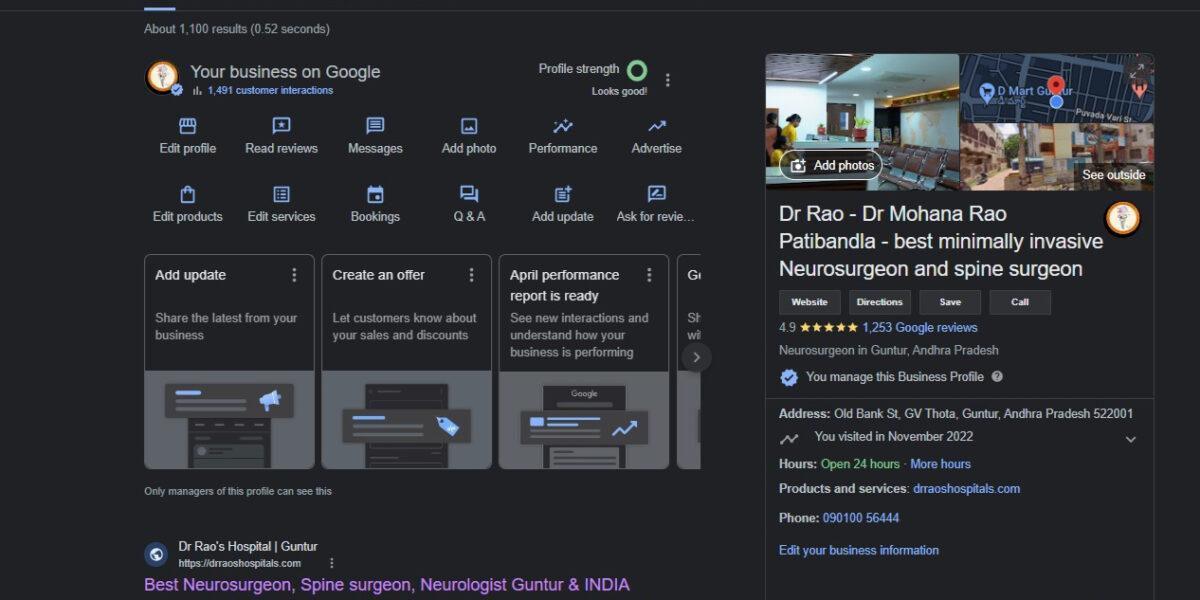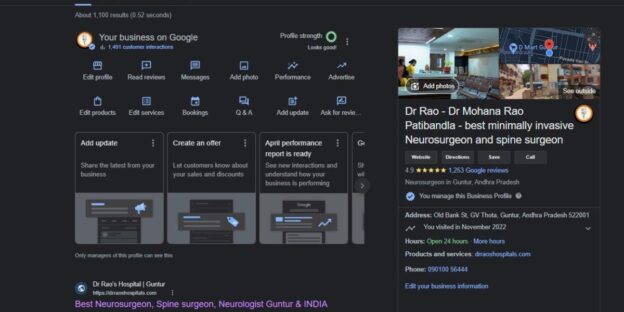Decoding the Neuroscience of Decision-Making: Insights from Dr. Rao and Dr. Rao’s Hospital
The Science Behind Decision-Making: How Your Brain Makes Choices
Discover the fascinating science behind decision-making and gain insights from Dr. Rao, a renowned neurologist, and the exceptional care provided at Dr. Rao’s Hospital. Uncover the neural mechanisms, cognitive biases, and strategies to optimize decision-making processes for a more informed and fulfilling life.
Introduction:
Every day, we face countless decisions, ranging from simple choices like what to eat for breakfast to complex life-altering decisions. Have you ever wondered how your brain processes these choices? The science of decision-making provides fascinating insights into the neural mechanisms behind our decision-making processes. In this blog, we explore the science behind decision-making, the expertise of Dr. Rao, a renowned neurologist, and the exceptional care provided at Dr. Rao’s Hospital.
Understanding the Neural Processes of Decision-Making:
Decision-making is a complex cognitive process influenced by external factors, internal biases, and neural computations within the brain. Recent advancements in neuroscience have shed light on the intricate neural networks and regions involved in decision-making, unraveling the science behind our choices.
Dr. Rao’s Expertise in Decision-Making Neuroscience:
Dr. Rao, a distinguished neurologist known for his expertise in decision-making neuroscience, has made significant contributions to the field. With a deep understanding of the brain’s intricate workings, Dr. Rao offers valuable insights into how neural processes shape our decision-making abilities.
Dr. Rao examines the brain’s executive functions, cognitive processes, and neural circuits involved in decision-making through his research. Dr. Rao provides valuable insights into the neurobiology of decision-making by investigating the interplay between different brain regions and neurotransmitters, such as dopamine and serotonin.
Dr. Rao’s Hospital: A Hub for Neurological Expertise:
Dr. Rao’s Hospital, renowned for its excellence in neurology and neurosurgery, encompasses a multidisciplinary team of experts dedicated to understanding and optimizing decision-making processes. The hospital’s state-of-the-art facilities and patient-centric approach make it a trusted destination for individuals seeking comprehensive neurological care.
The Science Behind Decision-Making:
- The Role of Emotions: Neuroscience has revealed that emotions play a significant role in decision-making. Emotional centers in the brain, such as the amygdala, interact with regions responsible for reasoning and judgment, influencing our choices. Dr. Rao’s expertise helps individuals understand the emotional biases that can impact decision-making and develop strategies for more objective choices.
- Neural Networks and Pathways: Decision-making engages various brain regions, including the prefrontal cortex, anterior cingulate cortex, and striatum. These regions communicate through neural pathways, allowing us to weigh options, evaluate consequences, and make decisions. Dr. Rao’s research sheds light on how these networks operate and how they can be optimized for better decision-making.
- Cognitive Biases: The brain’s decision-making processes are not always rational or objective. Cognitive biases, such as confirmation bias or the framing effect, can skew our judgments and choices. Understanding these biases helps individuals recognize and mitigate their impact, leading to more informed decision-making.
- Risk Assessment and Reward Processing: The brain’s reward system, primarily regulated by dopamine, influences our risk and reward assessment. Neuroscience research delves into how the brain weighs potential gains and losses, impacting decision-making. Dr. Rao’s expertise provides insights into how individuals can effectively navigate risk-reward scenarios.
- Implications for Real-Life Decision-Making: The knowledge gained from decision-making neuroscience has practical applications in various domains, such as business, healthcare, and personal life. Understanding the neural processes allows individuals to make more informed choices, enhance problem-solving skills, and mitigate potential biases.
Optimizing Decision-Making:
- Practice Self-Awareness: Developing self-awareness helps individuals recognize their own biases and emotional influences on decision-making. Dr. Rao recommends introspection and reflection to cultivate a deeper understanding of personal decision-making tendencies.
- Gather and Evaluate Information: Making informed decisions relies on gathering relevant information and objectively evaluating it based on facts and evidence. Dr. Rao’s expertise guides individuals in identifying reliable sources, analyzing data, and considering multiple perspectives before making decisions.
- Manage Emotional Influences: Emotions can sometimes cloud judgment and lead to impulsive decisions. Dr. Rao’s guidance helps individuals navigate their emotional states, fostering emotional regulation and allowing for more rational decision-making.
- Consider Long-Term Consequences: Many decisions have long-term implications. Dr. Rao emphasizes the importance of considering future consequences and weighing immediate gratification against long-term goals. This perspective helps individuals make decisions that align with their values and aspirations.
- Seek Expert Advice: Expert advice can provide valuable insights and perspectives in complex situations. Dr. Rao’s Hospital offers access to a team of specialists who can provide expert guidance tailored to individual circumstances.
- Embrace Neuroplasticity: The brain is adaptable and can be trained to improve decision-making skills. Engaging in activities stimulating cognitive functions, such as puzzles, strategic games, and mindfulness exercises, can enhance cognitive flexibility and improve decision-making abilities.
Conclusion:
Understanding the science behind decision-making empowers individuals to make more informed, rational choices. Dr. Rao’s expertise in decision-making neuroscience and the exceptional care provided at Dr. Rao’s Hospital offer invaluable insights into optimizing our decision-making processes.
Individuals can make decisions that align with their values, goals, and long-term well-being by unraveling neural mechanisms, identifying biases, and developing strategies to manage emotions and assess risks.
Whether it’s making choices in personal relationships, professional endeavors, or healthcare decisions, the science of decision-making provides a roadmap for more effective and fulfilling outcomes. By harnessing the expertise of professionals like Dr. Rao and leveraging the resources available at Dr. Rao’s Hospital, individuals can navigate the complexities of decision-making with confidence and clarity.
Let us embrace the fascinating science behind decision-making, unlocking its potential to enhance our lives and lead us to a future filled with wise choices and meaningful outcomes.
Tags: neuroscience of decision-making, Dr. Rao, Dr. Rao’s Hospital, cognitive biases, neural mechanisms, optimizing decisions, rational choices, expert guidance, emotional regulation, risk assessment


